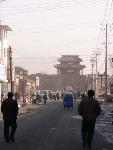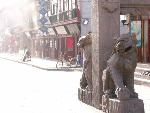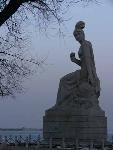- Getting around Lijiang. Dont stay in the Old Towns more than 2 days, there is nothing to do. KRISS Oct 9, 2013 05:46
- 2013 Beijing Temple Fair BENNYLAU Feb 26, 2013 03:29
- Malaysian traveling from KUL - LAX vis Shanghai PVG ZATI_DY Jan 3, 2013 20:15
California's Xingcheng
- Views: 5057
- |Vote: 0 0
- |Add to Favorites
- |Recommend to Friends
Xingcheng on Ice
I'd never heard of Xingcheng - a gorgeous, ancient seaside town on China's East Coast in lower Liaoning - and few Westerners have. That doesn't mean it doesn't get its regular influx of both national and international tourists, however - in the summer months, visitors from within China and from Russia especially come to enjoy the cool climate and natural spring waters every year, spending their evenings shopping in Xingcheng's ancient quarter, the walled city. Although things get quieter in Winter, I jumped at the chance to visit the hometown of my good friend and dedicated Travel China Guide community member, known to all by his curious English name - California. California was spending the Spring Festival at home with his family, and I was very grateful for the chance to stop by and see for myself this city that had somehow escaped the majority of travel publications and yet seemed so fascinating - natural hot springs? A beautiful swimming beach? A small town on an island offshore? An ancient walled Ming Dynasty city? It seemed to me that if Xingcheng had everything that California said it did, then it deserved a far better reputation than it currently has.
I could have timed it better. The entire Northeast was undergoing a cold snap on the day I arrived, and Xingcheng, being right on the coast, was hit by sea winds and going through its coldest day this winter. California was hardly recognisable when he met me at Xingcheng's train station, wrapped up in a thick red snow jacket and woolly hat. I was wearing much too little and regretting it. There was little one could do about the temperature, however, and so we set off to have a look at the ancient city, less than ten minute's walk from the station, California shaking his head as we set out, saying, "you really should have come in summer".
There had been a striking statue of a Ming Dynasty general in the station square, and as we walked, California filled me in on its details, which served as an interesting introduction to Xingcheng's history. The statue was of Yuan Chonghuai, born in 1584 in Guangxi, who had been posted to Xingcheng (then called Ningyuan) in 1622. Before long he was called on to protect the city from invasion by the great Nurhachi, the brilliant leader of the Manchu whose campaigns against the Ming administration eventually saw it overthrown and the Qing Dynasty founded in its place. Yuan Chonghuai made an elegant defence, and as Nurhachi retreated after countless failures, he was heard to say "I've never lost a battle since I was 25, why will this little town not fall?" Nurhachi died on his way back north, and it was not until his successors employed more elegant military tactics later on that they were finally able to overthrow the city, the last outpost of the Ming outside the Great Wall at Shanhaiguan.
Xingcheng's walls proved sturdy in those times, and now Xingcheng is one of the only four cities in China whose ancient wall remains intact.
The Ancient Quarter
I was much impressed as California led me to the city's Western Gate - that dark brickwork cast into an imposing and unmistakably Chinese wall hadn't been moved in 500 years, and although noticeably weathered, looked as strong today as it must have to Nurhachi. The ancient quarter of Xingcheng is comparable to the city of Pingyao in Shanxi, with the exception that Pingyao has also retained much of its architecture within the walls and is larger - it's only a short walk between Xingcheng's four gates, and where most cities from this period have a drum and bell tower, Xingcheng has just one central old structure serving as both. The small scale of Xingcheng is certainly sweet, however, and many edifices still remain - making the city eminently explorable.
Ascending the Drum and Bell Tower gave us a good vista over the whole city, and even a fair way beyond the wall. In the East we could clearly see the recently restored Yuan Chonghuai Mansion, where the great General resided. There are several exhibits on display at the top of a steep, thin staircase, including some very well-preserved helmets and heavy weapons that still seem sharp. Several plaques expand on the history of Xingcheng, and the huge old drum hung in its chamber, painted with two red and green dragons dancing in the air. The most curious item on display is a spherical meteorite that fell on the city in 1981 - resembling a cannonball from the heavens, we could only wonder what people of ancient times might have thought had it fallen in days of old.
We headed down the south street, Xingcheng's pedestrian mall and most well preserved sector. A pair of ancient gates (fang) arched over the walkway, flanked by old stone lions. California told me that each year on the Yuanxiao Festival (the last day of the Spring Festival period) families from around Xingcheng will come to rub the lions for good luck. He surveyed the lions regretfully - "poor lions are worn bare" he commented - as centuries of good fortune seekers had smoothed much of the details from the carvings.
At the South Gate, you can ascend the city wall and wander around the battlements - however, it seemed that the gatekeepers were taking a day off, and so we moved on to the Confucius Temple a short walk to the East from there. The temple is the most ancient in all of Dongbei, built in 1430, and is the largest ancient building in all of Liaoning Province. It's in remarkably good condition, and features a collection of old steles and markers gathered from around the area. A white statue of Confucius stands in the central garden, a monument to philosophy, reason and morality in the traditional place of religion and superstition. We wandered around the peaceful temple alone, without anyone - not even temple staff - to be seen. Xingcheng, it seems, is one city that drops everything for the Spring Festival - not even the public busses were running - which perhaps explained the rather lazy, festive atmosphere we could feel in this small city of only 600,000 people. It was a feeling I rather liked.
The Frozen Sea
I always seem to do everything in the wrong order. California had told me that there were two main reasons visitors come to Xingcheng aside from the ancient city - the hot springs attract visitors in the colder months, and the seaside brings travellers in the warmer weather. Xingcheng's hot springs are exceptional - discovered in the Tang Dynasty, the naturally warm water is potable and thought to have medicinal properties - you can drink as you bathe and hope it's healthy. California mentioned that Mongolian people traditionally have their annual baths in Xingcheng, a thought that might discourage bathwater tasting. In any case, I had made the unusual choice of visiting the beach despite the cold - I guess it had been too long since I'd seen the ocean.
I'd never seen the frozen sea before, and when I arrived at Xingcheng's attractive beach I was astounded. Where there should have been rolling blue waves, instead I found an alien landscape of choppy masses of thick ice, chunky and raw, broken and cold. I stepped onto the sand - smooth, golden sand it was too, probably very comfortable in the summer - and stared out over the ice sheets to see if I could make out the hazy shape of Chrysanthemum Island - the largest island off Liaoning's coast - where a tiny township lives isolated from the rest of Dongbei. California had told me that in the summer, boats frequently carry tourists to this island, where the natural scenery and the Dragon King temple provide a stunning and remote resort for travellers. In winter as a child, California had made the dangerous trip across the sea ice by sled - it's a considerable distance, and I figured California must have been one brave kid.
As I wandered along the beach, I surveyed the seaside hotels and storefronts - it reminded me of a small town from my home country of New Zealand. Sweet and distant from the world, Xingcheng's seashore is the ideal place to escape the bustle of modern China and see a different face of the country, ice-cream in hand and swimsuit on, heading for the warm ocean.
Standing watch over the beach is a great statue of the Chrysanthemum Woman - an immortal who, according to legend, changed herself into the island to protect the city from a sea dragon. I didn't notice it at first, but when I turned back as I was walking up towards the town, I noticed her watching me. Statues of women are often cool and emotionless, but it struck me as I caught her gaze that the Chrysanthemum Woman was profoundly beautiful. Perhaps she caught my heart right then, or perhaps it was Xingcheng itself - I made her a promise to return in the months of sunshine.






 Copyright © 1998-2026 All rights reserved.
Copyright © 1998-2026 All rights reserved.
1.
Feb 6, 2006 20:16 Reply
CALIFORNIA said:
I was very happy to travel around with you in my hometown,and I hope we can return there in summer:-)Maybe we can walk on the city wall next time!
2.
Feb 6, 2006 20:06 Reply
JABAROOTOO said:
Small world indeed. I read a story written by a foriegn teacher working nearby who visited here. Thought I would also like to see it one day and hope I will.